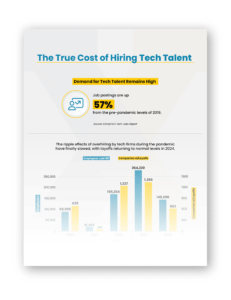“DevOps engineer” became the most recruited job on LinkedIn in 2018 – and demand continues to explode. But as a severe DevOps skills shortage makes it the top IT recruiting challenge for nearly half of organizations in 2021, nearshore outsourcing is emerging as the fastest and most effective way to access a highly professional talent supply with the sophisticated infrastructure and cultural compatibility that’s essential for peak performance.
By creating a single entity for fast service delivery, DevOps engineering practices are built to overcome the inefficiencies and performance issues that result from isolating development and operations into silos. Organizations that get DevOps right achieve a significant competitive advantage: experiencing 208x more frequent software deployments, 2,604x faster recovery from incidents, and 7x lower change failure rates, according to the 2019 State of DevOps report.
But while the U.S. saw a whopping 300,000+ job openings requiring DevOps skills over the past 12 months, 64% of companies say finding skilled resources with DevOps engineering skills is challenging, states the 2021 Upskilling Enterprise DevOps Skills report. Nearly half rank retention as a serious concern as well.
And as organizations compete for a limited talent pool, Gartner predicts that 75% of DevOps initiatives will fail to meet expectations through 2022.
Let’s dig into why nearshore outsourcing holds the key to successfully resolving the DevOps skills shortage and ensuring on-time delivery for your projects.
What’s making DevOps the most in-demand IT skill
In the post-pandemic era, the switch to remote work has made DevOps expertise more essential than ever before, requiring tech teams capable of managing the complex, evolving landscape of cloud infrastructure.
While DevOps practices can be used for any type of IT service delivery, many cloud projects involve DevOps – capitalizing on the ability of a continuous development cycle to improve IT productivity, speed time to market, meet the needs of business units faster, catch issues earlier, and deliver higher-quality software.
As a result, DevOps engineering skills are more in-demand than any other IT-related skill, with 64% of companies seeking DevOps expertise above cloud certifications, machine learning and data science skills, and even industry knowledge.
But the newness of DevOps culture combined with the nation’s severe tech talent shortage makes hiring DevOps professionals no easy task.
DevOps requires resources trained to utilize new tools, new processes, and a dramatic cultural shift from the traditional way IT performs service delivery. At the same time, they must keep up with the rapid advancement of next-gen technologies like cloud computing and automation.
DevOps engineering skills are projected to grow 122% over the next five years, creating one of the fastest-growing skill sets in the workforce, according to the 2021 DevOps Skills report. DevOps also requires an advanced level of soft skills like communication, collaboration, and adaptability to succeed in complex, multi-functional business environments.
Staff competition for DevOps engineering skills drives salaries and turnover sky-high
Making matters worse, the IT talent crunch caused 2020 to begin with nearly 918,000 unfilled tech jobs in the U.S. – leading to millions in lost productivity, The Wall Street Journal reports. That’s before the pandemic accelerated digital transformation efforts.
And while COVID’s Delta variant slowed job growth overall in August, the IT sector remains on track to add between 132,000 and 152,000 new positions in 2021, according to Computerworld – a significant increase from the industry’s previous peak of 112,500 new roles in 2015.
The unemployment rate for IT occupations stood at 1.5% in August, compared to 5.2% across all industries, Computerworld reports.
With such surging demand, companies that successfully hire DevOps talent in-house can expect to pay a premium. While the pandemic halted pay raises for many sectors, DevOps salaries rose in 2020 – with more than a third of U.S. employees earning between $150,000 and $250,000 per year.
Pent-up demand for new opportunities during COVID is also expected to trigger a “turnover tsunami” this year – with as many as half of workers looking for new jobs, the Society for Human Resource Management (SHRM) reports.
At 13.2%, tech already experiences the highest turnover of any industry. Replacing skilled tech positions like DevOps in the tight job market costs enterprises an average 100 to 150% of salary.
.png)
How nearshoring can overcome the DevOps skills shortage for IT
Fortunately, there’s a simple and cost-effective solution for North American companies struggling to hire and afford DevOps resources. Outsourcing DevOps to top nearshore locations in Latin America like Costa Rica and Colombia enables IT leaders to access a deep well of exceptionally skilled, experienced talent for a fraction of the cost of hiring similar resources in the U.S.
Many nearshore locations have invested heavily into becoming technology hubs and developing tech talent. For instance, Costa Rica is so proficient in tech it’s been recognized as the Silicon Valley of Latin America. More than 350 multinational organizations maintain operations in the country, including tech giants like Intel, IBM, Microsoft, and Amazon Web Services.
Costa Rica boasts one of the best educational systems in the region as well, including two of the most prominent technology universities. As a result, its nearshore providers benefit from a constant flow of skilled IT graduates with cutting-edge expertise – helping to expand the country’s digital labor force by 17% annually.
Tapping into this highly proficient talent pool enables enterprises to achieve significant cost savings without sacrificing quality. For example, outsourcing to Costa Rica delivers an average 30-50% labor arbitrage compared to IT resources in the U.S.
By comparison, offshore locations like India often struggle to find top DevOps engineers willing to work for their bottom-of-the-barrel cost structures – especially for overnight shifts that align with U.S. business hours. If they do, it can increase costs so significantly it nearly negates offshore savings.
Unfortunately, the difficulty of doing business across faraway time zones – and the language and cultural barriers that plague Asian-based outsourcing solutions – undercut the speed, synergies, and responsiveness essential to DevOps.
An abundance of available IT jobs also has offshore providers grappling with alarmingly high turnover rates. India’s IT sector suffered an attrition rate of 21.5% in 2019, Deloitte reports, impacting the consistency of delivery and training costs.
Nearshoring resolves these pain points and more. Strong English fluency, a westernized culture, and shared or similar time zones enable agile, real-time collaboration with U.S. teams. With so many American companies operating in the region, Latin America resources are also well-versed in American business practices.
The deeper pool of highly skilled, multilingual talent further combines with Latin America’s less competitive labor market to make it easier for providers to recruit top talent for every shift, delivering a proven track record of best-in-class, 24×7 support.
Top nearshore locations like Costa Rica also mitigate outsourcing risk with modernized infrastructure, workers with better healthcare and living conditions, and a world-class coronavirus response that earned United Nations recognition.
Speed the pace of innovation with the right DevOps partner
Demand for DevOps engineering skills is surging in today’s hyper-competitive business environment, as organizations face mounting pressure to keep up the pace of innovation and deliver robust digital services faster to their customers and employees.
However, the severe DevOps skills shortage in the U.S. is forcing a wholesale rethinking of how IT Departments shape their talent-based structures. Nearshoring DevOps to an exceptional Latin American provider delivers instant access to the tools, expertise, and highly skilled engineers that organizations need to maintain and mature a successful DevOps practice.
Stay tuned for our upcoming white paper that further explores why nearshoring holds the key to solving cloud and DevOps challenges plaguing North American organizations.






